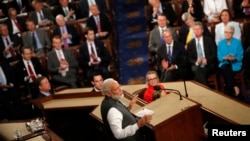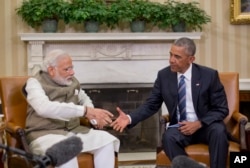Indian Prime Minister Narendra Modi addressed a joint meeting of the U.S. Congress on Wednesday and called for a closer relationship between India and the U.S., particularly in the area of terrorism.
“The fight against terrorism has to be fought at many levels. And the traditional tools of military, intelligence or diplomacy alone would not be able to win this fight,” Modi said before members of the Senate and House of Representatives.
“We have both lost civilians and soldiers in combating [terrorism]. The need of the hour is for us to deepen our security cooperation,” he added.
In addition to terrorism, some congressional members are interested in India’s positions on nuclear and maritime security, and military threats from China, North Korea and Iran.
Modi’s trip to the U.S. is an attempt to strengthen the burgeoning relationship between the two countries. It is also an opportunity for Modi to assert India as a global power and tout its economy as the world’s fastest growing.
White House meeting
Modi met with U.S. President Barack Obama on Tuesday and afterward Obama announced India would proceed with the construction of six nuclear reactors that will be built by U.S. companies, the result of a landmark civilian nuclear agreement the two countries reached in 2008.
The White House is also working with Modi to finalize an agreement on defense logistics. And Modi and Obama announced after their meeting that India would approve the Paris climate accord by year’s end.
House Speaker Paul Ryan invited Modi to address a joint meeting of Congress Wednesday, the fifth Indian prime minister to do so since 1985. The last speech was delivered in 2005 by Modi’s predecessor, Manmohan Singh.
Modi’s speech before Congress was delivered after years of being ignored by the U.S. over religious violence in his home state. He was denied a U.S. visa in 2005 after Indian authorities found the government in his home state of Gujarat, where he was the top official, was responsible for Hindu-Muslim riots there in 2002 that claimed the lives of more than 1,000 people, mostly Muslims.
U.S. officials generally avoided Modi until he became prime minister in 2014, and since visited the U.S. four times.





